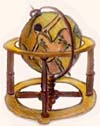|


"bulldozed
into the amnesia of the new capital"

Peter recommends these online literary links.
|
|
Germany, 8 May 1995
with thanks to John Milful
Caspar David Friedrich's romantic wanderer,
still wanders through his dreamlike landscapes,
amid the banners of the Third Reich,
the Berlin Wall and the pre-paid futures
of all the pensioners who cannot remember
the armies of the West and the armies of the East,
and the bubble-gum music on radio.
Exhibitions, panel discussions,
Jews, Sinti and Roma,
jet across the continent
interviews, mini-series, ceremonies
death camps on every channel
except the sports channels.
In the background cranes and bulldozers,
levelling the ground for this New Germany:
history is the empty space
of the Potsdamer Platz.
And we remember Goethe and Schiller,
the Weimar Republic, the horror:
Buchenwald is a Beech Forest,
where communists and socialists
were removed from the face of the earth
and homosexuals tortured to death.
But communists, socialists and homosexuals
are not in at the moment: this is the age of
the post-operetta where any tune goes
as long as it is not red.
The Führer bunker is bulldozed
into the amnesia of the new capital
between Sony and Daimler Benz
the writing on the wall, before it collapsed:
The intelligentia can't keep up with me -
IM FASTER.
The wall with its message speechless and
cold.,
as Fritz Hölderlin would have said.
Peter Horn
Peter Horn is professor and head of department of German at the University
of Cape Town. He has published widely on German and South African
Literature. He is the author of 7 volumes of poetry, of which Poems
1964-1989 (Ravan Press 1991) has earned him an honourable mention in the
Noma Awards for Publishing in Africa. The most recent volume is The Rivers
that connect us to our past, (Mayibuye). A collection of short stories, The
Kaffir who reads books, has earned him the Alex La Guma/Bessie Head Price
1993. His poetry has been widely published in journals all over the world,
and translated into French (Derrière le vernis du soleil. europePosie
1993), Italian, Portuguese, Spanish, German, Polish, Xhosa and Tagalog.

Back to the Poetry
|







